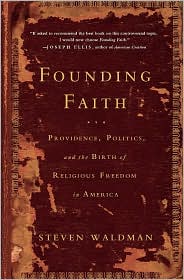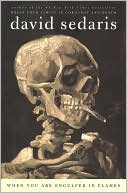It's been a madhouse here at Dregs, with all kinds of behind-the-scenes monetary sizzle keeping me from my appointed rounds as a blogger. But in my spare time, I've been reading some fascinating books. To wit:
Instead of starting with a viewpoint, then using the writings of the Founding Fathers to back it up, Waldman goes the other way around. He investigates history, along with the written records of Washington, Adams, Franklin, Jefferson, and Madison, to determine what these guys believed, why, and how it fit with the prevailing religiosity of the times. I tend to not read political books because they're usually all about preaching to the choir, but this one doesn't preach at all--just lays out the facts. Should be recommended reading for all schoolchildren. Perhaps I should contact Waldman and/or Random House about doing a Student Edition? It worked out so well for me in the past.
Kenneally is pretty dead-set on none of these things pointing to God at all, and she offers no concrete examples, but ultimately, I liked the book because of that. Essentially, she tracked down a bunch of scientists working in the field and posed all these types of questions to them. The answers vary, but that's part of the charm of the book--it just shows how little we actually know about our brains--and ourselves. It isn't anti-God, but you'll have to navigate past a lot of evolutionary jabber to make it through this one. If you can do that without foaming at the mouth, I recommend it.
(For the record, I've been rehashing a lot of my thoughts/beliefs about the way the world came into being. I still believe God is the designer of this world, but I have no concrete opinions on how he designed it. At this point, I'm closest to C.S. Lewis's viewpoint, presented in chapter six or so of The Problem of Pain. End of side note.)
I first heard his literary brilliance when he made an appearance on The Late Show with David Letterman to promote his book Me Talk Pretty One Day, and he read an essay so side-splittingly hilarious that I immediately retrieved said book from the library the following day. And I was hooked.
Then I read his stuff out of order, as it was available from the library. Naked was pretty good. Holidays on Ice, with the exception of "The Santaland Diaries," was a letdown. Soon he had another collection: Dress Your Family in Corduroy & Denim, which followed in the wacky-family/crazy-childhood vein of Me Talk Pretty One Day. Hilarious stuff, but much of it shockingly vulgar.
I didn't know what to expect from this new one, but I dove in with glee. And, while the man still knows how to be funny, he's growing up. I think he's approaching fifty now, and he seems to be contemplating the inevitable conclusion that he now has less life left in the tank than he's already used. Unlike me, who's staring at the tender age of 32, Sedaris seems to be aware that the time for telling funny stories with no point is coming to an end, and the time for passing on some wisdom has arrived.
But it's still funny. For real. 
Entertainment has a bad name. Serious people learn to mistrust and even to revile it. The word wears spandex, pasties, a leisure suit studded with blinking lights. It gives off a whiff of Coppertone and dripping Creamsicle, the fake-butter miasma of movie-house lobby, of karaoke and Jagermeister, Jerry Bruckheimer movies, a Street Fighter machine grunting solipsistically in a corner of an ice-rink arcade. Entertainment trades in cliche and product placement. It engages in regions of the brain far from the centers of discernment, critical thinking, ontological speculation. It skirts the black heart of life and drowns life's lambency in a halogen glare. Intelligent people must keep a certain distance from its productions. They must handle the things that entertain them with gloves of irony and postmodern tongs. Entertainment, in short, means junk, and too much junk is bad for you--bad for your heart, your arteries, your mind, your soul.
But maybe these intelligent and serious people, my faithful straw men, are wrong. Maybe the reason for the junkiness of so much of what pretends to entertain us is that we have accepted--indeed, we have helped to articulate--such a narrow, debased concept of entertainment, sensitive at any depth, and over a wide spectrum. But we have learned to mistrust and despise our human aptitude for being entertained, and in that sense, we get the entertainment we deserve.
Wait, wait. Don't go on yet. Go back and read it again, for it is important. It is a brilliant summation of our current culture, and one with which I cannot agree more. Have you read it again, because, seriously, you should.
Okay, moving on, some thoughts about pop culture/entertainment:
The pop artisan operates within the received formulas--gangster movie, radio-ready A-side, space opera--and then incorporates into the style, manner, and mood of the work bits and pieces derived from all the aesthetic moments he or she has ever fallen in love with in other movies or songs or novels, whether hackwork or genius (without regard for and sometimes without consciousness of any difference between the two)... When it works, what you get is not a collection of references, quotes, allusions, and cribs but a whole, seamless thing, both familiar and new: a record of the consciousness that was busy falling in love with those moments in the first place. It's that filtering consciousness, coupled with the physical ability (or whatever it is) to flat-out play or song or write or draw, that transforms the fragments and jetsam and familiar pieces into something fresh and unheard of. If that sounds a lot like what flaming genius gods are supposed to be up to, then here's a distinction: the pop artisan is always hoping that, in the end, the thing is going to kill. He is haunted by a vision of pop perfection: heartbreaking beauty that moves units.
See what I mean? I need to offer no commentary; the man is a writing savant who understands his craft well. In fact, I would say that, though this book strives for greater ambition, it is the best book about writing I've read since (shockingly) Stephen King's.
The latter portions of the book are more for Chabon fans who've read his works and who would therefore be interested in learning the germs that became the ideas that became books like The Amazing Adventures of Kavalier & Clay or The Yiddish Policemen's Union. If you haven't read his work, you might be lost toward the end, but then, with gems like these, you might just find yourself entertained and inspired. I know I was:
...There is a degree to which... all literature highbrow or low, from the Aeneid onward, is fan fiction... Through parody and pastiche, allusion and homage, retelling and reimagining the stories that we were told before us and that we have come of age loving--amateurs---we proceed, seeking out the blank places in the map that our favorite writers, in their greatness and negligence, have left for us, hoping to pass on to our own readers--should we be lucky enough to find any--some of the pleasure that we ourselves have taken in the stuff we love: to get in on the game. All novels are sequels; influence is bliss.

1 comment:
My head hurts. I love what you posted but now I feel like an idiot because it took so much work to open my mind to wrap my brain around such amazing and amazingly simple, profound concepts. Thanks. (intended in all the many colors of expression which an oral rendition of the word could imply)
Chana
Post a Comment